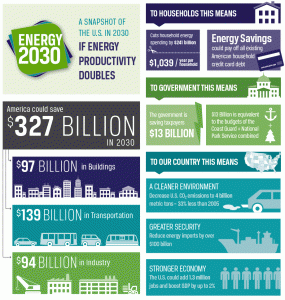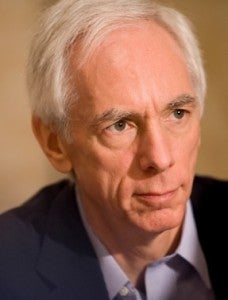Experts Unveil Plan To Double U.S. Energy Productivity By 2030
Achieving Goal Could Cut Carbon Pollution By One-Third And Save $327 Billion Annually
The Alliance Commission on National Energy Efficiency Policy released a report today with recommendations that would put the U.S. on a path towards doubling its energy productivity by 2030. The Commission, which is chaired by U.S. Senator Mark Warner (D-Va.) and National Grid U.S. President Tom King, is a diverse coalition of energy leaders that includes representatives from energy utilities, academia, industry and environmental groups. Fred Krupp, President of Environmental Defense Fund (EDF), serves on the Commission.
The Commission found that a doubling of energy productivity (or obtaining twice as much output from the energy we use) would reduce U.S. carbon dioxide pollution down to four billion tons per year by 2030, which is 33 percent below 2005 levels. The full report is available at energy2030.org.
“The Alliance Commission’s recommendations are an innovative approach to greatly increasing our nation’s use of energy efficiency, which represents a huge – and largely untapped – opportunity,” said Fred Krupp, President of EDF. “Reducing wasted energy through efficiency is a true win-win solution that cuts harmful pollution and saves people money on their energy bills.”
The Commission’s recommendations are wide-ranging, covering multiple sectors of the economy. The recommendations include: increased stringency of energy efficiency standards for buildings and appliances, creation of financing mechanisms that bring down the cost of energy efficiency projects, reform of utility regulatory policies to enable full use of cost-effective energy efficiency and greater support for research and development.
Achieving the Commission’s goal of doubling energy productivity by 2030 would:
- Add 1.3 million jobs;
- Cut average household energy costs by more than $1,000 a year;
- Save American businesses $169 billion a year;
- Increase gross domestic product (GDP) by up to 2 percent;
- Decrease energy imports by more than $100 billion a year; and
- Reduce CO2 emissions by one-third.

EDF is particularly encouraged by the Commission’s recommendations related to energy efficiency finance and smart grid policies, which are a high priority for EDF. The Commission recommends that state and local governments work with utilities to create financing mechanisms, such as On-Bill Repayment (OBR) programs. OBR provides a new route to funding clean energy investments at attractive terms, relying solely on private third-party financing.
OBR programs offer an opportunity for residential and commercial utility customers to finance energy efficiency projects with loans repaid through their utility bills and financed at no additional cost to ratepayers. The Commission also recommends reforms to state utility regulatory policies that would break down barriers to utility investment in energy efficiency and enable greater use of advanced new technologies that create a smarter and cleaner electric power grid.
Though the U.S. currently lags behind other nations on energy productivity, the Commission believes there are more than $1 trillion in energy-saving opportunities with the right federal, state and local government support, and private-sector buy-in.
The Alliance Commission’s goal of doubling energy productivity by 2030 is ambitious, yet attainable, and it goes well beyond capturing the well-known, low-hanging fruit. I am confident that the solutions proposed by the Commission will drive innovation and technological advancements, which will modernize U.S. manufacturing and help us to compete globally.












